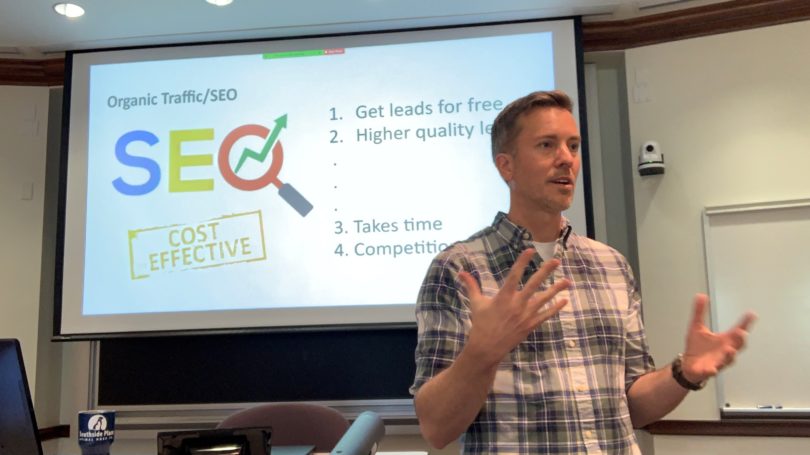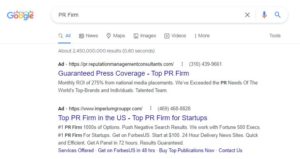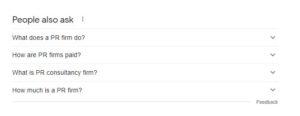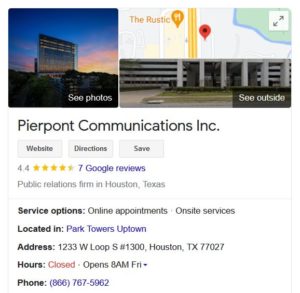Why PR is the Secret Ingredient for Successful SEO

Ranking well in search engine results pages (SERPs) is getting harder and harder—especially for non-branded search terms. (Branded search terms are queries on search engines that include the name of a company, business or brand. Non-branded searches don’t feature brand-specific terms — for example, “men’s clothing” vs. “Banana Republic.”)
But what are the reasons for the increased difficulty among non-branded search terms?
- Increased competition: More and more businesses are taking SEO seriously and working hard to rank high in SERPs. Search Engine Journal reports that more than 50% of businesses increased their SEO budgets in the last year.
- Crowded SERPs: Even if a business manages to have some pages rank in the top 10 in search, their entry may be so far down the results page that searchers don’t even notice it. This is due to the proliferation of Google Ads, the “People also ask” section and featured snippets. Here’s a screenshot of a recent search for the non-branded term “pr firm.” Note that the first two results are ads.

Before we even reach the actual organic results, Google presents “People also ask.”

And unless you’re ranked in the top five in organic search, you’re far less likely to get clicked on: most users don’t scroll past the 5th result.
So what’s a company to do about SEO? Invest in PR built around your branded search terms. Here’s why:
- Branded search terms perform better: In general, branded keywords have better click-through rates than non-branded keywords. This makes sense, as searchers using the name of a company or product probably have a clearer intent (to purchase, schedule a reservation, subscribe, etc.) than a searcher using a non-branded keyword.
- It’s easier to rank for branded search terms: By correctly building web pages, especially the homepage, with effectively integrated branded keywords, most companies should be able to rank at the top of organic search results for their branded terms.
- There is less “clutter” around branded terms on SERPs: Searches for branded terms are not only less likely to show Google Ads (most competitors won’t bid on a company’s name, although it does happen), but the featured snippets are more likely to show the brand’s content. For example, Google displays this when showing results for “Pierpont Communications”:

The challenge now becomes how to best drive organic search around your branded term. One often overlooked answer is public relations (PR). Earned media, the result of effective PR, is powerful as it represents a form of approval from journalists, influencers, and media that your target demographics view as an authority on the subject. Their authority transfers to you, boosting your credibility and visibility among your audiences.
Earned media coverage will also drive interest in your brand names and products in online search, as news coverage often leads to a spike in search volume. Here’s an example from one of our clients, who had coverage in the Wall Street Journal and USA Today in mid-November about one of their signature products. This coverage led to increases in online searches and a corresponding bump in pageviews for that product:

Now, PR doesn’t mean churning out a bunch of press releases and hoping they will lead to increased search traffic. Effective PR means positive coverage in credible outlets that are read, watched or listened to by your key audiences or customers.
A credible PR agency can help businesses with the following:
- Appearing in a news article focused on the company or one of its products
- Securing a news interview with a company’s executive or subject matter expert (SME)
- Publishing original content, like an Op-Ed or bylined article, in a credible news outlet
- Guesting on a podcast
- Promoting newsworthy events that spotlight the company or its products
Earned media content can lead to direct links or, more likely, searches for the organization’s branded name, its products, or its SMEs (whose names are effectively branded search terms). This is one of the best ways to improve awareness and credibility for your business and drive engaged and interested users to your website. Any positive coverage should also be amplified on social media channels to get more leverage the credibility and authority of the news outlets that aired or published the story.
This is not to say that PR should be your only strategy – far from it. Effective PR is just one element of an integrated communications strategy that can include:
- Online advertising
- Blog posts
- Non-branded SEO
- Social media
- Traditional marketing
None of these activities should be siloed off from the others. The sum of these will be stronger and more effective than any one tactic by itself. The accumulation of effective communication across all these channels will help drive business for any successful organization.
If you would like to learn more about how Pierpont can improve your public relations and branded search results, contact us today.
Contact Us